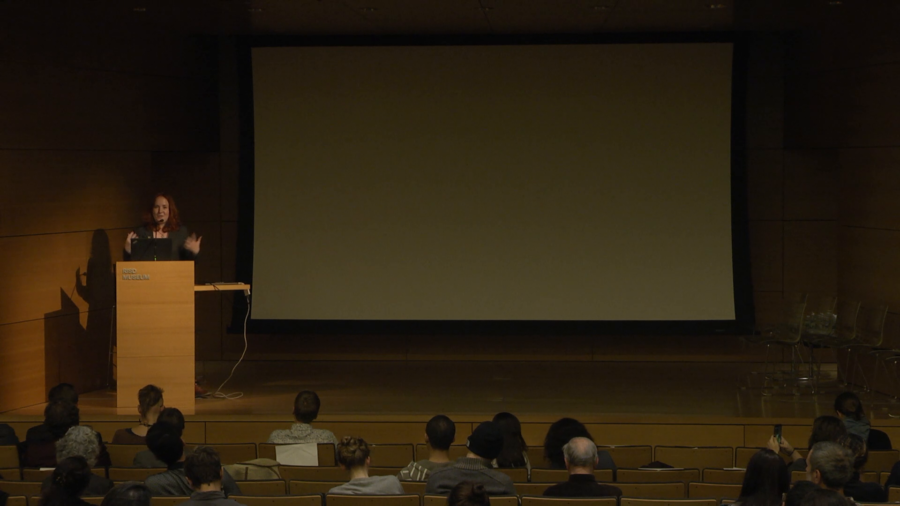Sophie Lewis: My name’s Sophie Lewis. I’m a writer based in Philadelphia. A para-academic…academic in exile. Thank you very much— Oh and I’m a member of the Out of the Woods collective with Kai. Unless I’m outing him. Anyway.
Thank you for inviting me, a non-design person, to this forum to as I understand it provide a little bit of speculative prose and some grounded, queer utopianism that happily may inspire or abut some of the aesthetic orientations that are being cooked up here.
Earlier this year I published a book entitled Full Surrogacy Now: Feminism Against Family about how children don’t belong to anyone, about proliferating relations of care, about abolishing the nuclear heteronormative family, and about gestational labor both paid and unpaid. Its title, Full Surrogacy Now, means two dialectically opposed things. It is simultaneously a utopian cry for the queer gestational commune, and a description of what’s going on right now, which is very much not that. The dystopian structure of planetary reality in the present. Indentured service, subalternity, crowdfunding, outsourcing, neofeudalism, civil strifes, invisiblized sub-sub-contracting, and above all—to use the phrase of Shellee Colen—reproductive stratification.
So, when the term “assisted reproductive technology” came on the scene in the 80s, the short version is that some black feminists like Angela Davis sort of said these are not new reproductive technologies. That this relation of surrogacy is nothing new. Black women were never the owners of the property that they produced with the products of their gestational labor on the plantation, and in many ways reproduction is already always “assisted.” The point is what kinds of assistance do we want to manifest.
So in this prescriptive sense, Full Surrogacy Now is meant to be a manifesto, and the injunction “full surrogacy now” is inspired by queer black polymaternalist feminisms and anti-work Marxisms, as I’ve sort of indicated. It’s in this sense a way of evoking the world that we might build that would do justice to the already active kind of porousness and bodily generosity that capitalism currently steals from us, and hands into all manner of accumulation schemes and rentierships and private institutions like the family.
And this is not perhaps what the majority of people think of when they hear the words “ecological design,” but there’s a growing number of us who see children’s liberation, gestational justice, and specifically the labor of anthrogenesis, right, literally the manufacturing of human bodies, as a central component of the generation of livable future landscapes. Queer utopian cyborg ecologists, for whom it’s always been obvious that the human body is a multispecies relationship, and that we are all the makers of one another (the question being can we learn to act like it) are I think part of the— Thank you for considering us part of this conversation here today.
The final chapter of Full Surrogacy Now attempts in speculative watery language to make the link between all this family abolitionist gestational utopianism that has gone before and ecological practices a bit more obvious. It’s called Amniotechnics, and that’s what I’ve been invited to read from today. So, here goes.
[Most of the rest of this presentation is a reading, with some commentary, from Sophie’s book and so will not be reproduced here except the final paragraph before closing comments. However, the chapter was adapted from a previous essay at The New Inquiry also titled “Amiotechnics.” Though edited and rearranged for the book, much of the content is the same.]
Our wateriness is our surrogacy. It is the bed of our bodies’ overlap, and it is, not necessarily—but possibly—a source of radical kinship. To an extent, bodies up always leaky, parasited, and non-unitary, as the vital and varied flora of bacteria in everybody, not just literally gestating ones, demonstrates. In the accounts of earthly life given by biologists such as Lynn Margulis, we are all revealed to be disconcertingly pregnant, multiply-pregnant, with myriad entities, bacteria, viruses, and more, some of whom are even gestating us.
So the question is, how do we actualize that given that all reproduction is assisted, although it’s certainly going to be up to us since technocrats won’t do it for us, to pursue ways to tweak bodily biology to better privilege, protect, support, and empower those with uteruses who find themselves put to work by a placenta, for example, in a spirit of ecological abundance. Let’s bring about the conditions for manufacturing one another more safely, enjoyably, and non-competitively. Let’s hold one another hospitably, explode notions of hereditary parentage and propertarian biology, multiply real solidarities. Let’s build a gestational commune based on comradeship, and a society sustained by the notion of kith, the old word that used to be an alternative to the word kin, that refers to affinities based on place and action rather than by fictions of blood. Where pregnancy is concerned, let every pregnancy be for everyone. Full surrogacy now. Thank you very much.
Further Reference
Climate Futures II event page
